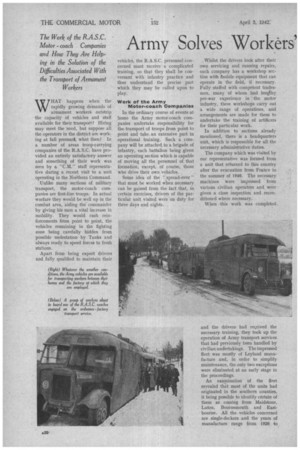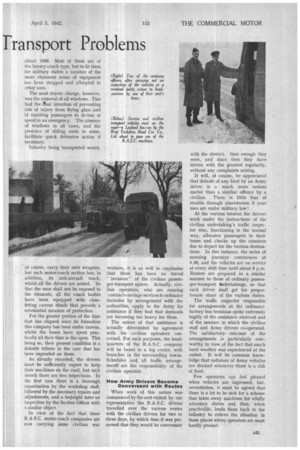Army Solves Work&s' Transport Problems
Page 22

Page 23

If you've noticed an error in this article please click here to report it so we can fix it.
The Work of the R.A.S.C. Motor coach Companies and How They Are Helping in the Solution of the Difficulties Associated With the Transport of Armament Workers
XIHAT happens when the \ rapidly growing demands of armament workers outstrip the capacity of vehicles and staff available for their transport? Hiring may meet the need, but suppose all the operators in the district are working at full pressur& what then? In a number of areas troop-carrying companies of the R.A.S.C. have provided an entirely satisfactory answer and something of their work was seen by a "C.M." staff representative during a recent visit to a unit operating in the Northern Command.
Unlike many sections of military transport, the motor-coach companies are first-line troops. In actual warfare they would be well up in the combat area, aiding the' commander by giving his men a vital increase in mobility. They would rush reinforcements from point to point, the vehicles remaining in the fighting zone being carefully hidden from possible molestation by Tanks and always ready to speed forces to fresh stations.
Apart from being expert drivers and fully qualified to maintain their vehicles, the R.A.S.C. personnel concerned must receive a complicated training, so that they shall be conversant with infantry practice and thus understand the precise part which they may be called upon to play.
Work of the Army Motor-coach Companies
In the ordinary course of events at home the Army motor-coach companies undertake responsibility for the,transport of troops from point to point and take an extensive part in operational training. Such a company will be attached, to a brigade of infantry, each battalion being given an operating section which is capable of moving all the personnel of that formation, except, of course, those who drive their own vehicles.
Some idea of the "spread-over" that must be worked when necessary can be gained from the fact that, in certain exercises, drivers of the particular unit visited were on duty for three days and nights. Whilst the drivers look after their own servicing and running repairs, each company has a workshop section with fnobile equipment that can operate in the field, if necessary. Fully staffed with competent tradesmen, many of whom had lengthy pre-war experience in the motor industry, these workshops carry out a wide range of operations, and arrangements are made for them to undertake the training of artificers for their particular work.
In addition to sections already mentioned, there is a headquarters unit, which is responsible for all the necessary administrative duties.
The company which was visited by our representative was formed from a unit that returned to this country after the evacuation from France in the summer of 1940. The necessary machines Were impressed from various civilian operators and were given a close inspection and reconditioned where necessary.
When this work was completed and the drivers had received the necessary training, they took up the operation of Army transport services that had previously been handled by civilian undertakings. The impressed fleet was mostly of Leyland manufacture and, in order to simplify maintenance, the only two exceptions were eliminated at an early stage in the proceedings.
An examination of the fleet revealed that most of the units had originated in the southern counties, it being possible to identify certain of them as coming from Maidstone, Luton, Bournemouth and Eastbourne. All the vehicles concerned are single-deckers and the years of manufacture range from 1926 to about 1936. Most of them are of the luxury-coach type, but to fit them for military duties a number of the more elaborate items of equipment has been stripped and allocp.ted to other uses.
The most drastic change, however, was the removal of all windows. This had the 8ual intention of preventing risk of injury from flying glass and Of enabling passengers to de-bus at speed in an emergency. The absence of windows in all cases, and the presence of sliding roofs in some, facilitate quick defensive action if necessary.
Infantry being transported would, of course, carry their own weapons, but each motor-coach section has, in addition, its anti-aircraft truck, whilst all the drivers are armed. So that the men shall not be exposed to the elements, all the coach bodies have been equipped with closefitting canvas blinds that provide a substantial measure of protection. For the greater portion of the time that has elapsed since its formation this company has been under canvas, whilst the buses have spent practically all their time in the open. This being so, their present condition is a definite tribute to the care that has been expended on them.
As already recorded, the drivers must be sufficiently expert to keep their machines on the road, but each month there are two inspections. In the first case there is a thorough examination by the workshop staff, followed by the necessary repairs and adjustments, and a fortnight later an inspection by the Section Officer with a similar object.
In view of the fact that these R.A.S.C. motor-coach companies are now carrying some civilian war workers, it is as well to emphasize that there has been no forced " invasion" of the civilian passenger-transport sphere. Actually, civilian operators, who are running contract-carriage services to ordnance factories by arrangement with the authorities, apply to the Army for assistance if they find that demands are becoming too heavy for them.
The extent of that assistance is actually determined by agreement with the civilian operators concerned. For such purposes, the headquarters of the R.A.S.C. company will be based in a big centre, with branches in the surrounding towns. Schedules arici all traffic arrangementS are the responsibility of the civilian operator.
How Army Drivers Become Conversant with Routes When work of this nature was commenced by the unit visited by our representative the R.A.S.C. drivers travelled over the various routes with the civilian drivers for two or three days, by which time it was presumed that they would be conversant
with the district. Sure enough they were, and since then they have driV-en with the greatest regularity, without any complaints arising.
It will, of course, be appreciated that default of any kind by an Army driver is a much more serious matter than a similiar offence by a civilian. There is little fear of trouble through absenteeism if your men are under military law !
At the various termini the drivers work under the instructions of the civilian undertaking's traffic inspector who, functioning in the normal way, allocates passengers to their buses and checks up the numbers due to depart for the various destinations. In this instance, the series of morning journeys commences at 5.30, and the vehicles are on service at every shift time until about 8 p.m. Rosters are prepared in a similar manner to those of ordinary passenger-transport Onderta.kings, so that each driver shall get his proportionate share of the various duties.
The traffic inspector responsible for arrangements at the ordnancefactory bus terminus spoke extremely highly of the assistance received and of the manner in which the civilian staff and Army drivers co-operated. The satisfactory. outcome of the arrangements is particularly noteworthy in view of the fact that much hard weather was experienced at the outset. It will be common knowledge that radiators of Army vehicles are drained whenever there is a risk of frost.
Few operators can feel pleased when vehicles are impressed, but, nevertheless, it must be agreed that there is a lot to be said for a scheme that takes away machines for vitally necessary duties and then, when practicable, lends them back to the industry to relieve the situation in those places where operators are most hardly pressed.




















































